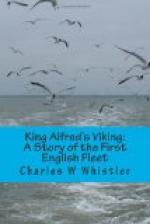“Wherein is hope. You think that I may have good seamen in time, therefore?”
“Ay, lord. It is in the blood of every man of our kin to take to the sea. They are like hen-bred ducklings now, and they do but want a duck to lead them pondwards. Then may hen cackle in vain for them.”
The king laughed.
“Faith,” he said, “I—the hen—drove Odda into the pond. He is, according to his own account, a poor duckling.”
“Let him splash about a little longer, lord king,” said Thord.
But Odda spoke with a long face.
“Not so, King Alfred, if you love me. Landsman am I, and chicken-hearted at sea. Keep the gamecock to mind the farmyard; there be more birds than ducks needed.”
“Make a song hereof, Harek,” said the king. “Here is word play enough for any scald.”
Then sang Harek, laughing, and ever ready with verses:
“The gamecock croweth bravely,
And guardeth hawk-scared hen roost;
But when the sea swan swimmeth
Against the shoreward nestings,
There mighty mallard flappeth,
And frayeth him from foray;
Yet shoreward if he winneth,
The gamecock waits to meet him.”
“That is in my favour,” said Odda. “Mind you the scald’s words, I pray you, lord king, and send me to my right place, even with hawk on one side and swan on the other.”
So a pleasant laugh went round, and then the king went back to his throne, and spoke words of open thanks to us of the fleet who had gained him such victory. Good words they were, neither too few nor too many, such as would make every man who heard them long to hear the like of himself again.
Now, while he was speaking, men came to the tent door and waited for his words to end; and then one came forward and told a noble, who seemed to be ordering the state which was kept, that Danish lords had come to speak with the king.
It seemed that this was expected, for when he heard it, Alfred bade that they should be brought in.
There were six of them in all, and they were in handsome dresses, but without mail, though not unarmed. The leader of them was Jarl Osmund, whom I had seen for a moment in Wareham street. I thought that his handsome face was careworn, as though peace would be welcome to him. But he and all his comrades carried themselves bravely.
Now there was long converse between the king and these chiefs, and it seemed that peace would be made.
Yet Alfred’s face was hard as he spoke to them—not like the bright looks with which he had jested with us just now, or the earnest kingly regard which had gone with his words of thanks.
Presently the Danes said that the whole force would retire into Mercia beyond Thames, harming none by the way, and keeping peace thereafter, if the conditions were honourable.
Then the king flashed out into scorn:
“What honour is to be looked for by oath breakers?”




